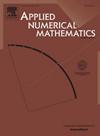不可压缩Navier-Stokes方程全离散有限元法的后验误差估计和时间自适应
IF 2.4
2区 数学
Q1 MATHEMATICS, APPLIED
引用次数: 0
摘要
本文研究了凸多边形域上不可压缩Navier-Stokes方程的后验误差估计。时间离散采用半隐式变步长两步后向微分公式(BDF2),空间离散采用Taylor-Hood有限元法(FEM)。利用不同的非线性项嵌入,证明了半隐式变步长BDF2有限元在不同CFL型条件下的能量稳定性。提出了两种近似解的适当重构,以获得时间离散误差。利用能量稳定性和二次重构,我们得到了完全离散近似的后验误差上下限。我们进一步发展了一种基于时间误差估计的有效时间步进控制的时间自适应算法。数值实验验证了理论结果和时间自适应算法的有效性。本文章由计算机程序翻译,如有差异,请以英文原文为准。
A posteriori error estimates and time adaptivity for fully discrete finite element method for the incompressible Navier-Stokes equations
In this paper, we study a posteriori error estimates for the incompressible Navier-Stokes equations in a convex polygonal domain. The semi-implicit variable step-size two-step backward differentiation formula (BDF2) is employed for the time discretization and the Taylor–Hood finite element method (FEM) is used for the space discretization. We prove energy stability of semi-implicit variable step-size BDF2 FEM under different Courant Friedreich Lewy (CFL)-type conditions by utilizing different embeddings for the nonlinear term. Two appropriate reconstructions of the approximate solution are proposed to obtain the time discretization error. Resorting to the energy stability and the quadratic reconstructions, we obtain a posteriori upper and lower error bounds for the fully discrete approximation. We further develop a time adaptive algorithm for efficient time step control based on the time error estimators. Several numerical experiments are performed to verify our theoretical results and demonstrate the efficiency of the time adaptive algorithm.
求助全文
通过发布文献求助,成功后即可免费获取论文全文。
去求助
来源期刊

Applied Numerical Mathematics
数学-应用数学
CiteScore
5.60
自引率
7.10%
发文量
225
审稿时长
7.2 months
期刊介绍:
The purpose of the journal is to provide a forum for the publication of high quality research and tutorial papers in computational mathematics. In addition to the traditional issues and problems in numerical analysis, the journal also publishes papers describing relevant applications in such fields as physics, fluid dynamics, engineering and other branches of applied science with a computational mathematics component. The journal strives to be flexible in the type of papers it publishes and their format. Equally desirable are:
(i) Full papers, which should be complete and relatively self-contained original contributions with an introduction that can be understood by the broad computational mathematics community. Both rigorous and heuristic styles are acceptable. Of particular interest are papers about new areas of research, in which other than strictly mathematical arguments may be important in establishing a basis for further developments.
(ii) Tutorial review papers, covering some of the important issues in Numerical Mathematics, Scientific Computing and their Applications. The journal will occasionally publish contributions which are larger than the usual format for regular papers.
(iii) Short notes, which present specific new results and techniques in a brief communication.
 求助内容:
求助内容: 应助结果提醒方式:
应助结果提醒方式:


